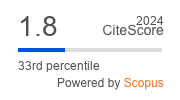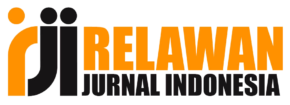Implementasi Haversine Formula untuk Pembuatan SIG Jarak Terdekat ke RS Rujukan COVID-19
Abstract
Haversine formula-based GIS has been created to find closest location to referral hospital handling COVID-19 in Semarang City. The objectives of this study were (1) to determine closest distance and compare the results with the calculation of Find Nearest Tool and Google Maps and (2) to design GIS. It was done through (i) primary and secondary data creation and processing, (ii) accuracy measurement using Haversine formula. GIS is built after the calculation results are obtained. Calculation of the distance from user’s starting point to referral hospital can be generated using Haversine formula. Comparison of measurement results between Haversine formula-based GIS and Find Nearest Tool, the average differences is 13 meters, the smallest difference is 3 meters and the largest difference is 40 meters. The differences between the calculation results of Haversine formula and Google Maps, the smallest difference is 0 meters, the largest difference is 5 meters, and the average differences is 3 meters. GIS creation obtained through designing use case, activity, class diagram, and user interface. The conclusion is Haversine formula-based GIS can be used as "Geographic Information System for the Search of Referral Hospital Handling COVID-19 in Semarang City" based on the closest distance from user's location.
Downloads
References
R. A. Azdy and F. Darnis, “Implementasi Bellman-Ford untuk Optimasi Rute Pengambilan Sampah di Kota Palembang,” J. Nas. Tek. Elektro dan Teknol. Inf., vol. 8, no. 4, p. 327, 2019, doi: 10.22146/jnteti.v8i4.532.
R. H. D. Putra, H. Sujiani, and N. Safriadi, “Penerapan Metode Haversine Formula Pada Sistem Informasi Geografis Pengukuran Luas Tanah,” J. Sist. dan Teknol. Inf., vol. 10, no. 2, pp. 1262–1270, 2015.
Y. Yulianto, R. Ramadiani, and A. H. Kridalaksana, “Penerapan Formula Haversine Pada Sistem Informasi Geografis Pencarian Jarak Terdekat Lokasi Lapangan Futsal,” Inform. Mulawarman J. Ilm. Ilmu Komput., vol. 13, no. 1, p. 14, 2018, doi: 10.30872/jim.v13i1.1027.
N. Panigrahi, Computing in geographic information systems. 2014.
C. Veness, “Calculate distance and bearing between two Latitude/Longitude points using haversine formula,” MIT Open Source, 2019. https://www.movable-type.co.uk/scripts/latlong.html (accessed Sep. 23, 2020).
P. Harsadi and D. Nugroho, “Implementasi Algoritma Dijkstra Dan Metode Haversine Pada Penentuan Jalur Terpendek Pendakian Gunung Merapi Jalur Selo Berbasis Android,” J. Teknol. Inf. dan Komun., vol. 8, no. 1, pp. 61–67, 2020, doi: 10.30646/tikomsin.v8i1.483.
N. Chopde and M. Nichat, “Landmark Based Shortest Path Detection by Using A* and Haversine Formula,” GH Raisoni Coll. Eng. …, vol. 1, no. 2, pp. 298–302, 2013, [Online]. Available: http://www.ijircce.com/upload/2013/april/17_V1204030_Landmark_H.pdf.
M. A. Nur and N. Wardhani, “Penerapan Formula Faversine dalam Perhitungan Luas WilayahMenggunakan Koordinat Google Maps,” J. IT, vol. 9, no. 1, pp. 58–64, 2018.
P. Dauni, M. D. Firdaus, R. Asfariani, M. I. N. Saputra, A. A. Hidayat, and W. B. Zulfikar, “Implementation of Haversine formula for school location tracking,” in Journal of Physics: Conference Series, 2019, vol. 1402, no. 7, doi: 10.1088/1742-6596/1402/7/077028.
K. M. Wibowo, K. Indra, and J. Jumadi, “Sistem Informasi Geografis (SIG) Menentukan Lokasi Pertambangan Batu Bara di Provinsi Bengkulu Berbasis Website,” J. Media Infotama, vol. 11, no. 1, pp. 51–60, 2015, [Online]. Available: https://jurnal.unived.ac.id/index.php/jmi/article/view/252/231.
T. Wuryandari, A. Hoyyi, D. S. Kusumawardani, and D. Rahmawati, “Identifikasi Autokorelasi Spasial Pada Jumlahpengangguran Di Jawa Tengah Menggunakan Indeks Moran,” Media Stat., vol. 7, no. 1, pp. 1–10, 2014, doi: 10.14710/medstat.7.1.1-10.
L. P. A. Prapitasari, N. K. Sumiari, and N. K. D. A. Jayanti, “Sistem Informasi Geografis Pasar Tradisional di Wilayah Denpasar menggunakan Framework YII,” Sisfotenika, vol. 6, no. 2, pp. 205–216, 2016, doi: 10.30700/jst.v6i2.118.
Badan Pusat Statistik(BPS), Badan pusat statistik kota Semarang. 2019.
P. K. Semarang, “Covid-19 Kota Semarang,” https://siagacorona.semarangkota.go.id/, 2020. https://siagacorona.semarangkota.go.id/ (accessed Sep. 23, 2020).
World Health Organization, “Q&A on coronaviruses (COVID-19),” Who, 2020. https://www.who.int/emergencies/diseases/novel-coronavirus-2019/question-and-answers-hub/q-a-detail/q-a-coronaviruses (accessed Sep. 23, 2020).
“Bertambah, Ini Daftar 58 Rumah Sakit Rujukan Penanganan Virus Corona di Jawa Tengah.” https://www.kompas.com/tren/read/2020/03/15/165652365/bertambah-ini-daftar-58-rumah-sakit-rujukan-penanganan-virus-corona-di-jawa (accessed Sep. 23, 2020).
Syafri, S. H., “Identifikasi Kemiringan Lereng di Kawasan Permukiman Kota Manado Berbasis SIG,” Spasial, vol. 1, no. 1, pp. 70–79, 2015.
Hermawan, T.A., Nugraha, A.L. and Sudarsono, B., “Desain dan Visualisasi Kampus Universitas Diponegoro Berbasis WebGIS,” J. Geod. Undip, vol. 3, no. Januari, pp. 141–154, 2015.
“Find Nearest—ArcGIS Online Help | Documentation.” https://doc.arcgis.com/en/arcgis-online/analyze/find-nearest.htm (accessed Sep. 23, 2020).
E. Russell, “9 things to know about Google’s maps data: Beyond the Map | Google Cloud Blog,” 2019. https://cloud.google.com/blog/products/maps-platform/9-things-know-about-googles-maps-data-beyond-map (accessed Sep. 23, 2020).
S. Mulyani, “Pengertian Activity Diagram,” in Analisis dan Perancangan Sistem Informasi Manajemen Keuangan Daerah: Notasi Pemodelan Unified Modeling Language (UML), 2016.
E. N. Jannah, A. Hidayah, and M. Mas’ud, “Sistem Terintegrasi Berbasis Web untuk Pencarian dan Pemesanan Kelompok Seni Pertunjukan,” J. Nas. Tek. Elektro dan Teknol. Inf., vol. 5, no. 4, 2016, doi: 10.22146/jnteti.v5i4.270.
Copyright (c) 2020 Jurnal RESTI (Rekayasa Sistem dan Teknologi Informasi)

This work is licensed under a Creative Commons Attribution 4.0 International License.
Copyright in each article belongs to the author
- The author acknowledges that the RESTI Journal (System Engineering and Information Technology) is the first publisher to publish with a license Creative Commons Attribution 4.0 International License.
- Authors can enter writing separately, arrange the non-exclusive distribution of manuscripts that have been published in this journal into other versions (eg sent to the author's institutional repository, publication in a book, etc.), by acknowledging that the manuscript has been published for the first time in the RESTI (Rekayasa Sistem dan Teknologi Informasi) journal ;








